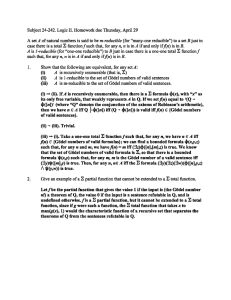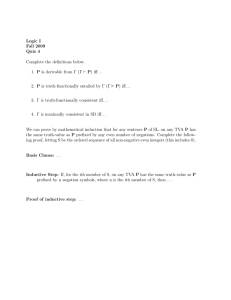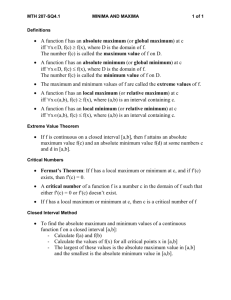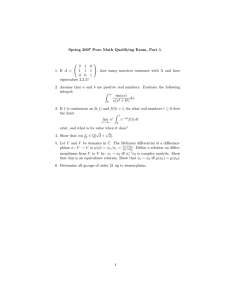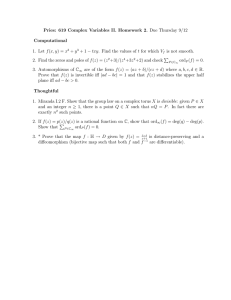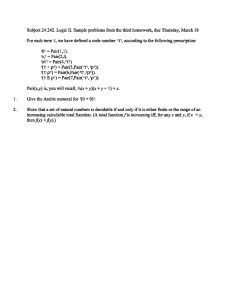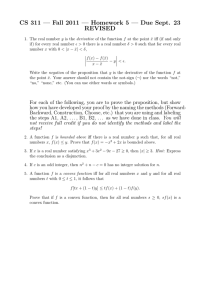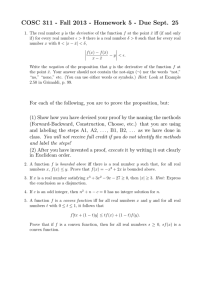Document 13524018
advertisement
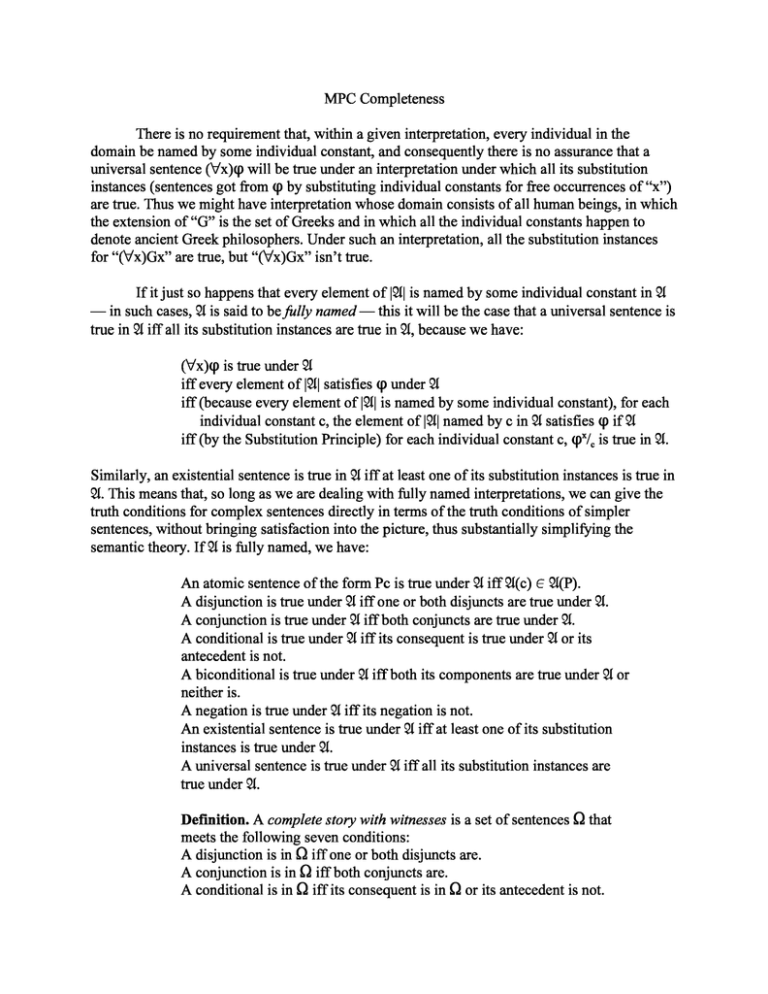
MPC Completeness
There is no requirement that, within a given interpretation, every individual in the
domain be named by some individual constant, and consequently there is no assurance that a
universal sentence (b'x)cp will be true under an interpretation under which all its substitution
instances (sentences got from cp by substituting individual constants for free occurrences of "x")
are true. Thus we might have interpretation whose domain consists of all human beings, in which
the extension of "G" is the set of Greeks and in which all the individual constants happen to
denote ancient Greek philosophers. Under such an interpretation, all the substitution instances
for "@'x)Gx" are true, but "@ir)Gx" isn't true.
If it just so happens that every element of IUI is named by some individual constant in U
such cases, U is said to behlly named -this it will be the case that a universal sentence is
true in U iff all its substitution instances are true in U, because we have:
-in
@'x)cp is true under U
iff every element of IUI satisfies cp under U
iff (because every element of IUI is named by some individual constant), for each
individual constant c, the element of IUI named by c in U satisfies cp if U
iff (by the Substitution Principle) for each individual constant c, cpX/,is true in U.
Similarly, an existential sentence is true in U iff at least one of its substitution instances is true in
U. This means that, so long as we are dealing with fully named interpretations, we can give the
truth conditions for complex sentences directly in terms of the truth conditions of simpler
sentences, without bringing satisfaction into the picture, thus substantially simplifying the
semantic theory. If U is fully named, we have:
An atomic sentence of the form PCis true under U iff U(c) E U(P). A disjunction is true under U iff one or both disjuncts are true under U.
A conjunction is true under U iff both conjuncts are true under U. A conditional is true under U iff its consequent is true under U or its antecedent is not. A biconditional is true under U iff both its components are true under U or neither is. A negation is true under U iff its negation is not. An existential sentence is true under U iff at least one of its substitution instances is true under U. A universal sentence is true under U iff all its substitution instances are true under U.
Definition. A complete story with witnesses is a set of sentences n that meets the following seven conditions: A disjunction is in iff one or both disjuncts are. A conjunction is in n iff both conjuncts are. A conditional is in n iff its consequent is in n or its antecedent is not. MPC Completeness, p. 2
n
A biconditional is in iff both it components are in or neither is. A negation is in iff its negatum is not. An existential sentence is in iff at least on of its substitution instances is. A universal sentence is in iff all its substitution instances are. n
n
The set of sentences true under a fully named interpretation form a complete story with
instances.
Complete stories with witnesses are important because of the converse result,
which was first noticed by Leon Henkin.' Given a complete story with witnesses in a
language with at least one individual constant: we can construct a fully named
interpretation under which all and only the members of are true. The construction is
not trivial, like the transition from a complete SC story to a NTA. This is because
interpretations have a more complex structure than NTAs.
n
Given a complete story with witnesses n , we want to define an interpretation U under
which all and only the elements of are true. We begin by listing the individual constants in
..., and we stipulate that U(ci) = i, and that
the language in a (finite or infinite) list
IUI is to be the set of natural numbers less that n (if the language has n constants) or else the set
of natural numbers (if the language has infinitely many constant^).^ Now let U p ) = {i: pci E
n
c,, el, c,, c3,
'"The Completeness of the First-order Functional Calculus," Journal of Symbolic Logic
14 (1949): 159-166.
'If the language has no individual constants at all, then a complete story with witnesses
will include every universal sentence and exclude every existential sentence. But there is no
interpretation under which "(b'x)(Fx A Fx)" is true, or under which "(3x)(Fx V Fx)" is false.
This because, when we were defining "interpretation," we chose, more-or-less arbitrarily, to
exclude interpretations with the empty domain. Making the opposite choice wouldn't have made
a whole lot of difference. See W. V. Quine, "Quantification and the Empty Domain," Journal of
Symbolic Logic 19 (1954): 177-179. Reprinted in Quine, Selected Logic Papers, enlarged edition
(Cambridge, Mass.: Harvard University Press, 1995), pp. 220-223.
-
-
I am taking for granted that, if the individual constants, if there are infinitely many of them, can
be paired off with the natural numbers like this: c,, el, c,, c3,.... Later on, I'll assume the same
thing holds true of the predicates. These two assumptions together will assure us that the
sentences of the language can be arrayed in an infinite list E,, El, E,, E3,.... These assumptions is
certainly satisfied by any language that people actually use, but there appear in pure mathematics
centain purely abstract formal languages whose symbols can't be arrayed in such a list. The
result that, for any complete story with witnesses, there is an interpretation under which all its
members are true, and the completeness theorem in whose proof we apply the result, continue to
hold in these abstract languages, but the proof has an extra twist.
MPC Completeness, p. 3
n,
n } , for each predicate P. Thus pCi is true in 2l iff U(CJ E U p ) iff i E U p ) iff PC, E
so that
an atomic sentence is true in 2l iff it's an element of An easy induction extends this
observation to all the sentences.
n.
We want to prove the Completeness Theorem, that is, we want to prove that, if an MPC
sentence is a logical consequence of a set I? of MPC sentences, then there is a derivation of
whose premiss set is included in I?. The plan is to assume that there is no derivation of whose
premiss set is included in I?, and then show that there is a complete story with witnesses that
includes I? without including X. This will show that isn't a logical consequence of I?.
x
x
x
x
The proof closely resembles the corresponding proof for SC, but there are a couple of
small complications arising from the fact that now we are providing witnesses. Here is one:
Suppose our set I? consists of all the sentences Gc, for c an individual constant, and let be
(Vx)Gx. I? doesn't entail X, and so there isn't any derivation of from I? (by soundness -any
sentence derivable from a set of premisses is a logical consequence of those premisses).
However, there isn't any complete story with witnesses that contains all the Gcs without
containing (Vx)Gx. The way around this difficulty is to add infinitely many new individual
constants at the beginning. Having an infinite supply of individual constants that don't appear
either in I? or in will give us the maneuvering room we need to construct our complete story
with witnesses.
x
x
x
x
Let I?, = I?. By hypothesis, isn't derivable fiom I?. We want to build up I?, into a
complete story with witnesses by building up larger and larger sets of sentences I?, c I?, c I?, c
..., going through the sentences one by one, and adding the sentence if doing so doesn't disrupt
the property that isn't derivable. The only complication is that, in order to make sure that the
complete story we are forming has witnesses, whenever we add in an existential sentence, we
need to add one of its substitution instances.
x
Enumerate all the sentences of the extended language as E,, El, E,,
property that isn't derivable fiom I?,, we fiom the set I?,, as follows:
x
.... Given I?, with the
x is derivable from I?, u {En},let I?,, = I?,.
Case 2. If x isn't derivable fiom I?, u (6,) and 5, isn't existential, let I?,, = I?, u {En).
Case 3. If x isn't derivable fiom I?, u (6,) and 5, has the form (3x)@,pick the first constant c
Case 1. If
that doesn't appear in I?, u {En,x), and let I?,,, = I?, u {En,v l , ) . We can do this because at the
very beginning we introduced an infinite supply of new constants.
x
We want to persuade ourselves that isn't derivable fiom I?,,,. Cases 1 and 2 are trivial. For
together with
Case 3, notice that, if we had a derivation of whose premiss set included
in our premiss set
various members of I?, u {En},then we could utilize rule ES to replace
by (3x)$. But this would give us a derivation of whose premiss set was contained in I?, u
{En},contrary to hypothesis.
x
x
vl,,
vl,
MPC Completeness, p. 4
Let I?, be the union of the I?$. Then x isn't derivable from I?,, but whenever a sentence
cp isn't in I?,, x is derivable from I?, u {cp). It follows that every sentence derivable from I?, is
an element of I?,, and also that, whenever cp isn't an element of I?,, (cp X) is an element of
I?,. Also, whenever I?, contains an existential sentence, it contains a substitution instance of the
-
existential sentence; if the existential sentence is tk,then a substitution instance of the
existential sentence is introduced in I?,+,.
We need to see that I?, is a complete story with witnesses. The proofs of the first five
clauses in the definitions of "complete story with witnesses" -that is, the proof that I?, is a
complete story -are unchanged from the sentential calculus, and there's no point in repeating
them here. We just noted that if an existential sentence is in I?,, then at least one substitution
instance is in I?,. That an existential sentence is in I?, if any of its instances are follows from the
fact that the existential sentence is derivable from each of its instances by EG. This leaves the
clause for universal sentences. In proving it, we take advantage of the fact that we already have
the first six clauses in the definition of "complete story with witnesses":
(Vx)cp is in I?,
iff (Vx)cp isn't in I?, (by the fifth clause) iff (3x) cp isn't in I?, (because I?, is closed under rule ES) iff no substitution instance of (3x)- cp is in I?, (by the sixth clause) iff no sentence of the form cpxIcis in I?,
iff every sentence of the form cpxIcis in I?,
iff every substitution instance of @ir)cp is in I?,. - -
-
Compactness Theorem. A set of MPC sentences is consistent if every finite subset is consistent. The proof is unchanged from the sentential calculus.
Lowenheim-Skolem Theorem. Every consistent set of MPC sentences
has model whose domain is the set of natural numbers.
If I? is consistent, then we can produce, in a language obtained from the language of I? by
adding infinitely many new individual constants, a complete story with witnesses that includes
I?. The Henkin model for this complete story with witnesses has the set of natural numbers as its
d~main.~
4Unlike our other results, the Lowenheim-Skolem theorem does depend on the
assumption that the sentences can be put into one-one correspondence with the natural numbers.
